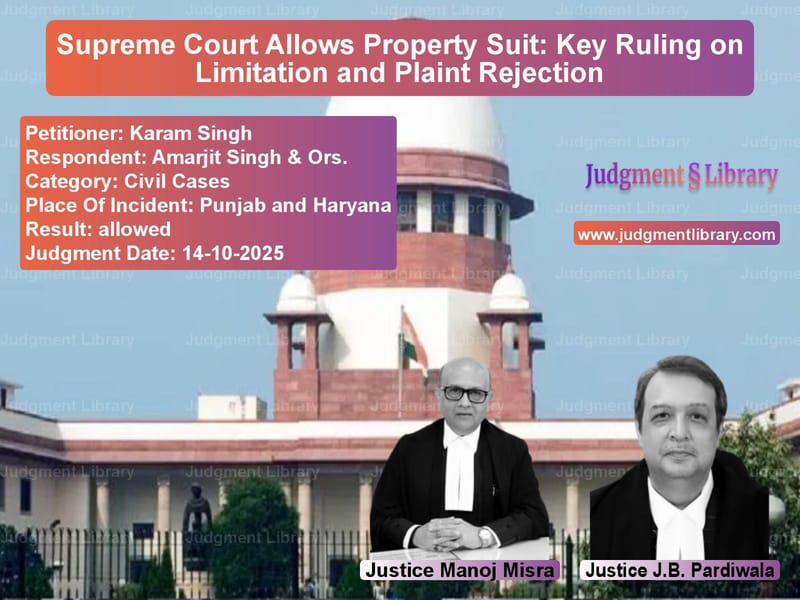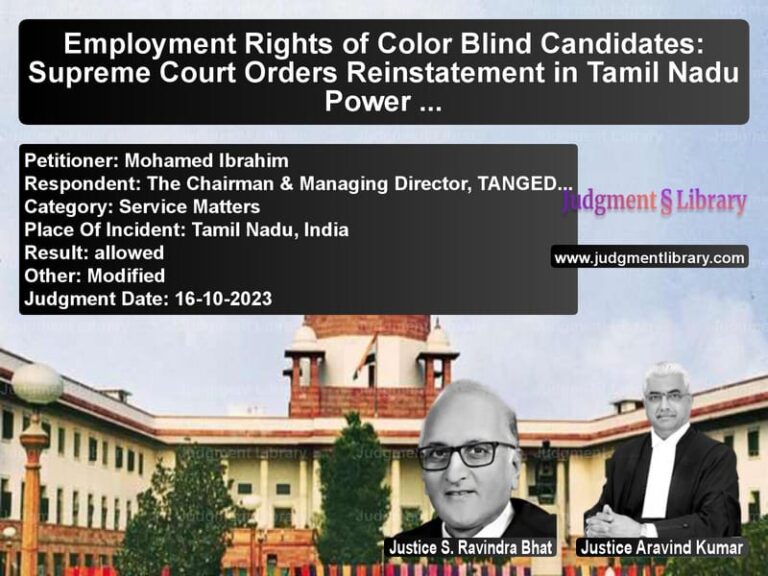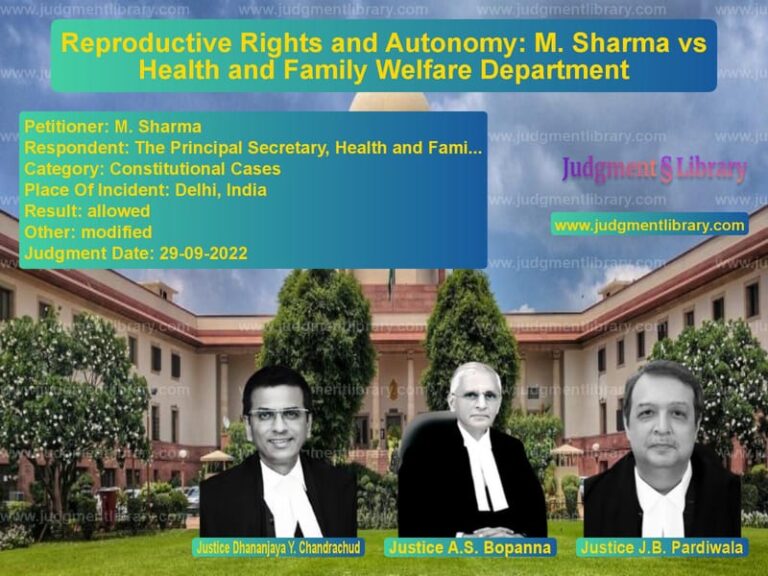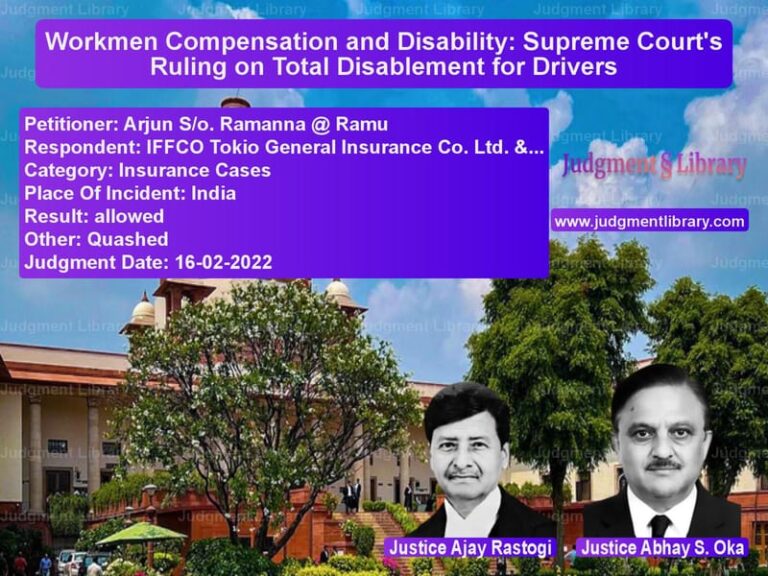Supreme Court Allows Property Suit: Key Ruling on Limitation and Plaint Rejection
In a significant ruling that clarifies the legal principles governing property disputes and limitation periods, the Supreme Court of India has allowed appeals challenging the rejection of a plaint in a long-standing property dispute. The case involved complex questions of inheritance, wills, and the appropriate time frame for filing civil suits when multiple legal proceedings have spanned decades.
The legal battle began when Karam Singh, along with Dilbag Singh, filed Suit No. 424 of 2019 against Amarjit Singh and several other respondents. The plaintiffs sought multiple reliefs including declaration of ownership of the suit land to the extent of their shares, possession of the suit land, damages and compensation for use and occupation, and a permanent prohibitory injunction. The core of their claim was that they were the natural heirs of Kartar Kaur, who was the widow of the original owner Ronak Singh.
The historical background of the case dates back to 1924 when Ronak Singh died intestate. A series of legal battles followed over the decades concerning succession to his estate. The defendants in the case had set up a will dated December 15, 1976, allegedly executed by Kartar Kaur in their favor. However, mutation proceedings based on this will continued for years, ultimately culminating only in 2017.
The Legal Challenge
The defendants filed an application under Order 7 Rule 11(d) of the Code of Civil Procedure, seeking rejection of the plaint on the ground that the suit was hopelessly barred by time. They argued that the plaintiffs had knowledge of the registered will since 1983, and therefore, the relief for declaration regarding the will, which has a limitation period of three years, was time-barred. They also contended that the plaintiffs had concealed the fact that a previous suit (Civil Suit No. 648 of 2012) had been filed by the father of plaintiff No. 1, which was rejected under Order 7 Rule 11 of CPC.
The trial court rejected the application under Order 7 Rule 11, holding that on a plain reading of the plaint, it could not be held that the suit was ex facie barred by limitation. The court noted that the question of limitation is a mixed question of law and fact that should not be decided at the threshold stage of rejecting a plaint.
However, the High Court took a different view and allowed the revision filed by the defendants. The High Court’s order dated January 27, 2022, which was passed ex parte, held that the suit was barred by time. When the plaintiffs filed an application for recall of this order, it was dismissed on July 4, 2022, leading to the appeals before the Supreme Court.
Arguments Before the Supreme Court
The appellant’s counsel made several crucial submissions before the Supreme Court. The learned counsel for the appellant submitted that the High Court committed a grave error in holding that the suit was barred by time. In holding so, the High Court observed that the suit was instituted after almost 36 years since culmination of mutation proceedings, which is incorrect in as much as mutation proceedings culminated on 20.07.2017 and the suit was instituted on 31.05.2019 (i.e., within three years thereof). This fundamental misreading of dates formed a critical part of their argument.
Additionally, the appellant’s counsel emphasized that the suit was for possession, based on title. Since the main relief was for possession, the limitation period would be 12 years from the date when the possession of defendants became hostile and adverse to the plaintiff. The High Court, however, failed to consider that aspect. This distinction between different types of reliefs and their corresponding limitation periods became central to the Supreme Court’s analysis.
The respondents, on the other hand, contended that the predecessor in interest of the appellant had earlier instituted Civil Suit No. 648 of 2012 seeking permanent prohibitory injunction, which was dismissed on May 17, 2013. They argued that since the present suit was based on the same cause of action, it was nothing but an abuse of the process of law. They also maintained that the suit was barred by limitation as plaintiffs had knowledge of the registered will since 1983.
Supreme Court’s Analysis and Reasoning
The Supreme Court, in its judgment delivered by Justice Manoj Misra with Justice J.B. Pardiwala, began by reiterating the fundamental principles governing rejection of a plaint under Order 7 Rule 11 of CPC. The Court emphasized that while considering rejection of the plaint thereunder only the averments made in the plaint and nothing else is to be considered to find out whether the suit is barred by law. At this stage, the defense is not to be considered. This principle would prove crucial in determining the outcome of the case.
The Court made several important observations about the nature of the proceedings and the reliefs sought. In the instant case, the plaintiff instituted the suit by claiming title through succession to the estate of late Kartar Kaur. On the other hand, the defendants had set up a will alleged to have been executed by Kartar Kaur in their favour. Neither the plaint nor any document brought on record indicated that the will was probated or its validity was tested and upheld in regular civil proceedings inter se parties. This highlighted the preliminary nature of the will’s legal status.
The Court also addressed the significance of mutation proceedings, noting that mutation entries do not confer title. They serve a fiscal purpose, that is, to realize tax from the person whose name is recorded in the revenue records. This clarification was important because the defendants had heavily relied on the mutation proceedings in their arguments about limitation.
One of the most significant aspects of the Court’s reasoning concerned the nature of the suit and the applicable limitation period. The Court observed that the suit was not for a mere declaration of the will being null and void but for possession as well. The plaintiff claimed title over the suit land by natural succession and sought possession based on title. Where a suit is for possession of immovable property or any interest therein, based on title, the limitation period is 12 years when the possession of the defendants becomes adverse to the plaintiff (vide Article 65 of the Schedule to the Limitation Act).
The Court relied on its earlier decision in Indira v. Arunugam & Anr., where it was held that when the suit is based on title for possession, once the title is established based on relevant documents and other evidence, unless the defendant proves adverse possession for the prescriptive period, the plaintiff cannot be non-suited. Consequently, when a suit is instituted for possession, based on title, to defeat the suit on the ground of adverse possession, the burden is on the defendant to prove adverse possession for the prescriptive period.
This allocation of the burden of proof became a decisive factor in the Court’s analysis. The Court noted that this, therefore, in our view, cannot be an issue on which the plaint could be rejected at the threshold. The question of whether the defendants had perfected their title by adverse possession was a mixed question of law and fact that could only be properly addressed after evidence was led during the trial.
The Court also addressed the argument regarding Order 2 Rule 2 of CPC, which deals with the omission to sue for one of several reliefs. The Court noted that the first suit instituted by the predecessor-in-interest of the appellant was not tried. In fact, the plaint of that suit was rejected under Order 7 Rule 11 of CPC as not being properly framed. In such circumstances, a fresh suit with appropriate relief cannot be, prima facie, barred by Rule 2 of Order 2 of CPC.
Court’s Final Ruling
In its concluding observations, the Supreme Court found that the High Court had committed a fundamental error in its approach. At this stage, we may observe that the High Court while deciding the revision has failed to consider the plaint averments in its entirety and was swayed only by the fact that will set up was 36 years old. It overlooked that will operates only on the death of the testator and here, after the death of the testator, the validity of the will was throughout questioned in mutation proceedings which continued and, ultimately, settled in the year 2017.
The Court emphasized that in between, whether the defendants perfected their title by adverse possession would be a mixed question of law and fact and can appropriately be addressed only after evidence is led. The same cannot be made basis to reject the plaint at the threshold.
Based on this comprehensive analysis, the Supreme Court allowed the appeals and set aside the impugned judgment and orders of the High Court. The order of the trial court rejecting the prayer to reject the plaint under Order 7 Rule 11 CPC was restored. The trial court was directed to proceed with the suit and bring the proceedings to their logical conclusion in accordance with law.
The Court specifically clarified that any observation made by us shall not be taken as an opinion on the merit of the issues which may arise for consideration in the course of the suit proceedings. We clarify that we have addressed those issues only with a view to find out whether it was a fit case for rejection of the plaint under Order 7 Rule 11 of CPC. This clarification ensures that the substantive merits of the property dispute remain open for determination in the trial court.
This judgment serves as an important precedent on the principles governing rejection of plaints, particularly in complex property disputes where multiple legal proceedings have spanned decades. It reinforces the principle that courts should be cautious about rejecting plaints at the threshold stage, especially when the case involves mixed questions of law and fact that require evidence for proper determination.
Petitioner Name: Karam Singh.Respondent Name: Amarjit Singh & Ors..Judgment By: Justice Manoj Misra, Justice J.B. Pardiwala.Place Of Incident: Punjab and Haryana.Judgment Date: 14-10-2025.Result: allowed.
Don’t miss out on the full details! Download the complete judgment in PDF format below and gain valuable insights instantly!
Download Judgment: karam-singh-vs-amarjit-singh-&-ors.-supreme-court-of-india-judgment-dated-14-10-2025.pdf
Directly Download Judgment: Directly download this Judgment
See all petitions in Property Disputes
See all petitions in Succession and Wills
See all petitions in Landlord-Tenant Disputes
See all petitions in Damages and Compensation
See all petitions in Other Cases
See all petitions in Judgment by Manoj Misra
See all petitions in Judgment by J.B. Pardiwala
See all petitions in allowed
See all petitions in supreme court of India judgments October 2025
See all petitions in 2025 judgments
See all posts in Civil Cases Category
See all allowed petitions in Civil Cases Category
See all Dismissed petitions in Civil Cases Category
See all partially allowed petitions in Civil Cases Category







